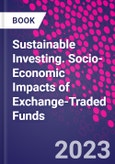Sustainable Investing: Socio-Economic Impacts of Exchange-Traded Funds examines the social and economic effects of sustainable investing ETFs and their impacts on the global financial system. The book presents the key issues with regard to sustainable investing, discussing exchange-traded funds mechanisms and categories in comparison to competing investment funds. The book outlines the theoretical determinants of ETF markets development and the effects of their diffusion, both at the investor and firm levels, as well as financial system, entire economy, and society levels. The book presents various possible implementations of sustainable investing, and covers the methodological aspects of their identification and categorization.
Hybrid investment products-such as exchange-traded funds that combine the investment features of mutual funds with the trading features of stocks-are one of the most rapidly growing categories of investment funds with their total global value reaching almost $5 trillion. The book examines the linkages between ETFs and the FinTech sector in the context of sustainable development, as well as global sustainable development policies in relation to their effects on the popularity of sustainable investing. The book concludes with a discussion of the significance for other entities that may be affected, such as policy makers and recipients of funds invested through sustainable investment strategies.
Please Note: This is an On Demand product, delivery may take up to 11 working days after payment has been received.
Table of Contents
1. Introduction2. Sustainable Investing: Methodological and Theoretical Background and Concepts
3. Exchange-Traded Funds: Methodological and Theoretical Background and Concepts
4. Sustainable Investing Exchange-Traded Funds: Methodological and Theoretical Background and Concepts
5. Sustainable investing Exchange-Traded Funds: Markets
6. Adoption Determinants of Sustainable investing Exchange-Traded Funds
7. Consequences of the Spread of Sustainable investing Exchange-Traded Funds
8. Conclusions and Recommendations
9. Annex: Methodologies








